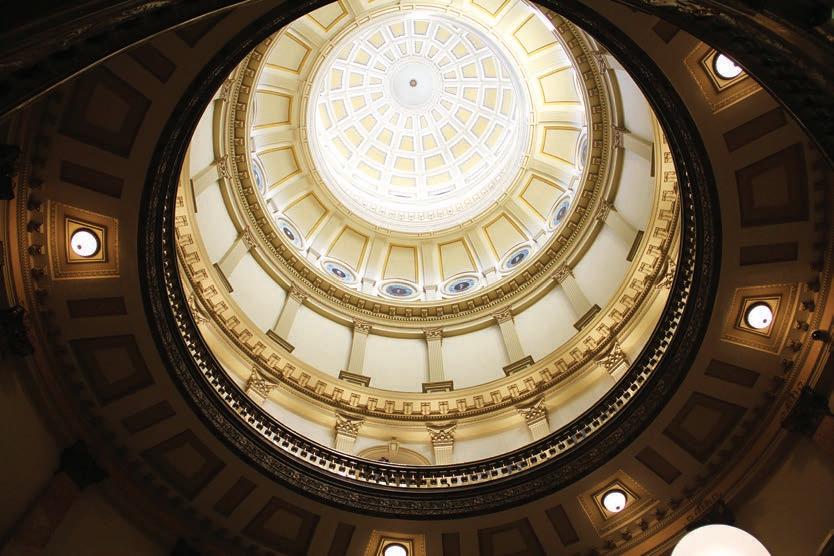
3 minute read
Coloradans could get up to $2.5 billion in tax refunds
BY JESSE PAUL THE COLORADO SUN
Coloradans will receive more than $2.5 billion in tax refunds from the state as long as there isn’t a recession, according to two quarterly economic and tax revenue forecasts presented this month to the legislature.
An economic downturn is increasingly likely, however, given international nancial instability, including stubborn in ation and the banking industry’s headline-grabbing struggles over the past month.
Nonpartisan Legislative Council Sta said the state government will collect $2.75 billion in tax revenue in excess of the Taxpayer’s Bill of Rights cap on government growth and spending in the current scal year, which ends June 30. e legislature is required to refund that money.
e Governor’s O ce of State Planning and Budget expects the TABOR cap to be exceeded by $2.7 billion in the current scal year.
e cap, set by a 1992 constitutional amendment passed by Colorado voters, is calculated by multiplying the prior year’s limit by in ation and population growth rates.
e money will predominantly be refunded to taxpayers in April 2024 in the form of checks tied to people’s income — with higher refund amounts going to higher earners — as long as the legislature doesn’t change the refund formula this year, as it did in 2022.

e forecasts are provided to the Colorado General Assembly to help lawmakers draft the state budget for the next scal year. e data presented in March to the legislature’s powerful Joint Budget Committee, which drafts the budget, is considered the most important each year because it’s used to set spending.
e good news for the legislature is that it will have all the money it’s entitled to. e bad news is that the in ation rate used to calculate the TABOR cap lags current economic conditions. at means that while the legislature would seem to have more money to spend next year, the amount is actually lower than this year’s when adjusted for real-time population and in ation increases. ere’s also a proposal swirling at the Capitol to ask voters to forgo their TABOR refunds and send the money to K-12 schools instead. e TABOR cap was exceeded last scal year by $3.7 billion, which prompted refund checks to be mailed to Coloradans last year. Another round will be mailed out in April, as well.
In fact, Greg Sobetski, chief economist for Legislative Council Sta , told the JBC that even without TABOR state budget revenue isn’t expected to keep up with in ation and population increases.
“We expect those revenue increases to not make up for the budgetary pressures that arise from in ation and population,” he said.
Still, state tax revenue is expected to exceed the TABOR cap through the 2024-25 scal year, which begins on July 1, 2024. at’s assuming Colorado voters don’t approve more reductions in the income tax rate — as conservatives are pushing for — and the legislature doesn’t pass new bills o ering tax breaks.
Legislative Council Sta and the governor’s o ce shared good and bad news about the state’s economy.
Overall, the state’s economy, like the nation’s, is slowing in the wake of rising interest rates set by the Federal Reserve. Unemployment in Colorado, however, remains low — 2.8% in January, which means it has returned to pre-pandemic levels — and isn’t expected to rise too much.
Legislative Council Sta forecasts the unemployment rate to be 2.9% at the end of 2023 before increasing slightly to 3.1% in 2024. e Governor’s O ce of State Planning and Budgeting says there are two job openings in Colorado for every unemployed person.
Coloradans’ personal savings, meanwhile, have shrunk amid high in ation, while credit card balances have risen.
“Some households may still have excess savings, but most lowerincome households spent down the excess savings acquired early in the pandemic,” Louis Pino, an LCS analyst, told the JBC.
Bryce Cooke, chief economist with OSPB, said if there is an economic downturn, Colorado will be well positioned to weather it.
“If the gap between the workforce and job openings remained similar to where it is now, you would see that people wouldn’t be losing jobs,” he said.
Cooke said bank failures in the U.S. and internationally are a real economic risk, though it will be tempered by the federal govern- ment’s willingness to respond to the situation.

Overall, Lauren Larson, who leads OSPB, said these are “uncertain economic times.” is story is from e Colorado Sun, a journalist-owned news outlet based in Denver and covering the state. For more, and to support e Colorado Sun, visit coloradosun.com. e Colorado Sun is a partner in the Colorado News Conservancy, owner of Colorado Community Media.












